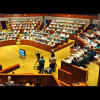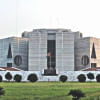Electronic Fiscal Devices to be mandatory in FY18-19
Resorts, hotels and businesses will have to use electronic fiscal devices (EFD) from the next fiscal year -- a move the revenue authorities have taken to combat value-added tax evasion.
Finance Minister AMA Muhith said use of EFD instead of Electronic Cash Register (ECR) and Point of Sale (POS) shall be made mandatory in all hotels, restaurants, resorts and shops across the country.
"This will enable the National Board of Revenue to have real-time access to business transactions which will eventually protect revenue leakage and increase revenue collection significantly," he said in his speech unveiling fiscal measures for fiscal 2018-19.
The EFDs, which will be connected online with a server at the National Board of Revenue, (NBR) would replace the conventional electronic cash registers (ECRs).
The NBR made the e-cash mandatory in 2008 for 11 types of businesses: hotels, restaurants, confectionaries, jewelers, beauty salons, wholesalers and large retail stores. Yet installation of the device has not expanded to the desired level.
At the same time, many businesses do not use the e-cash register even after installation to evade VAT allegedly in connivance with field officials of the revenue authority.
And success of the EFD management system will depend largely on enforcement by the revenue authority.
The NBR said EFDs will help curb evasion because of connection with the server that will generate real time data of sales at shops. Customers would be able to know if the VAT they paid went to the state coffer: they will receive a code that would be generated by the NBR's central server.
The move comes following advice from Finance Minister AMA Muhith to introduce an EFD management system to combat non-payment of VAT at the retail and wholesale levels.
The NBR earlier planned to buy 10,000 ECRs for large shops, wholesalers, restaurants and other businesses as part of its target to implement the VAT law 2012 from fiscal 2017-18.
The plan was scrapped after the government deferred the implementation of the law by two years. Last year, it identified 8,007 entities eligible for fitting the electronic sales devices.
At present, several thousand shops use electronic cash registers and point-of-sale machines. However, not all use the device to issue sales invoices to customers in an attempt to appropriate the VAT and hide actual transaction figures from taxmen.

 For all latest news, follow The Daily Star's Google News channel.
For all latest news, follow The Daily Star's Google News channel. 







Comments